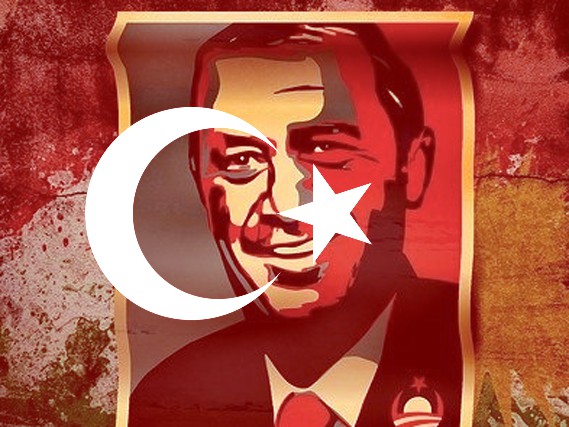Washington Kurdish Institute
By: Dr. Ismet Konak January 5, 2021
The Turkish government is gradually collapsing. Turkish President Recep Tayyip Erdogan’s palace evokes the image of a vehicle with the broken flywheel belt. Like the oxidation of exposed metal, the Turkish leadership is openly decaying while the world watches, undergoing a process very typical of any autocratic regimes. The “presidential government system”, which Tayyip Erdogan praises and under which he rules with absolute power, can no longer be “metabolized” by the treasury or budget. Indeed, if the entirety of Turkey can be seen as one body, then the country’s relatively new executive presidency system, is a toxin that is proving to be fatal. The public budget has reached a position that cannot tolerate the poison of the Presidential Complex, Erdogan’s immense new palace in the Beştepe neighborhood of Ankara. He literally lives like a king inside a 2,250-room palace, with his 16 aircrafts and 268 official vehicles at his disposal. The Anatolian land on which the palace sits is now, in effect, Erdogan’s imperial property (in Ottoman Turkish, memâlik-i şahane). Each year, his administration received a share from the state budget, consists of the taxes paid by all citizens, including Alevis and Kurds, who are systematically vilified by Erdogan and his allies and supporters.
Concepts such as transparency, an independent judiciary, and free press are now pieces of straw blown in the wind. The Erdogan administration has plunged Turkey into the swamp of absolutism. The “ouroboros” of Greek mythology, the snake biting its own tail, is an apt symbol the rotten palace regime. The autonomy or the independence of institutions like the constitutional court, Turkish Statistical Institute and central bank has been trampled. The oppressive “centralization” policy is now being rejected by many of Erdogan’s former colleagues, once his most ardent supporters. The resignations of Bülent Arinç, a member of the Presidential High Advisory Board, and Berat Albayrak, Minister of Treasury and Finance, are examples of this. We can only assume that Erdogan’s current allies, such as Devlet Bahçeli, who dutifully protect his throne, will soon take their places in the “museum of retired politicians”. This play is in its last act.
Erdogan’s palace, burning like a match, ignites any entity around it. It is clear that the Erdogan administration threatens the whole of Turkey’s society and nurses a hidden grievance (in Ottoman Turkish, gıllügiş), particularly against the will of the Kurdish people. The trustee attack, to which the People’s Democratic Party (HDP)-led Kars Municipality and many others were exposed, reveals the explicit reflex of the palace and the character of Turkish democracy. Citing Article 127 of the Constitution and Article 47 of the Municipality Law as a reason, the state appointed the governor of Kars as a trustee. This system, which is afraid of any functioning democracy, is doomed to the “administrative vandalism”. The palace regime made some changes in the constitution under the name of stability and “serenity”, preserving Article 127 of the Constitution as a means to act arbitrarily to maintain its administrative tutelage. Türker Öksüz, functioning as an attendant to the modern day sultan (in Ottoman Turkish, rikapdar), performed prayers in front of the Kars Municipality in an example of the miserable fanaticism of this regime. Militant governors, qaimaqams, judges and prosecutors have turned the country, in Maxim Gorky’s words, into “a dark pit where they mingled with each other like blind worms.”
Erdogan’s palace also reminds of Pandora’s Box, spreading “wickedness” and “unhappiness” throughout the country, and particularly among the Kurdish people. The murder of Servet Turgut, a 55-year old villager killed by Turkish military by being tortured and thrown from the helicopter in the Çatak district of Van, adequately reflects the attitude of the palace regime towards the Kurdish issue. Kemalists gave way to Islamists, though the chauvanism of the ruling regime remains a constant. As poet and satirist Neyzen Tevfik wrote long many decades ago, “The song is the same song, just the string has changed in the instruments.”
The approach taken by the palace administration was manifested in the massacres perpetrated by the Turkish state in Roboski, Sur and Cizre, and recently appeared in the prohibition of the Kurdish theater play “Bêrû (About Face)”. The playwright Dario Fo’s work titled “About Face: Klaxon, Trumpets and Raspberries” was adapted into Kurdish. His work concerned the connection between the power, capital and masses. However, it was banned by the judicial organs who serve as an instrument of the palace on the ground of the violation of the “public order”. Of course, by now there is no public order – society is dominated by the decrees emanating from the palace. Nation-states are essentially built on war and conquest. Instead of consent, they produce the “hostility”. The way to hegemony goes through the polarization, and hostility to the Kurdish people is a major feature of the Erdogan regime.
However, every night has a morning. Nights do not continue until doomsday (in Ottoman Turkish, tulû-i haşr). Just as France had to give in to Algeria’s protracted war for freedom, the days when the Turkish ruling class will have no choice but to acknowledge the just demands of the Kurdish people are near. Just as French Generals Thomas Bugeaud and Jacques Massu, who were responsible for the deaths of millions in Algeria, are now judged poorly by history, Abdullah Alpdogan, one of the perpetrators of the Dersim massacre, Ferik Salih Omurtak, an architect of the Zilan massacre, and Erdogan, who gave the order to kill dozens of civilians in Roboski, will face the same fate. And after that occurs, Erdogan’s palace will remain a symbol of waste, despotism and chauvinism.
Disclaimer: The views, opinions, and positions expressed by authors and contributors do not necessary reflect those of the WKI.

